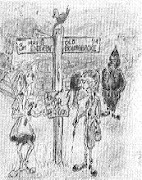One of the joys of the internet is serendipity.
For example, following a conversation in which my daughter confessed to complete ignorance of Alastair Cooke, I found transcripts of many of his Letter from America on the BBC website, most with an audio facility. I e-mailed her one or two and took the opportunity to listen to many of them myself.
In one of them Mr Cooke paid tribute to a recently deceased New York Jewish writer, who wrote novels about the wheeling and dealing of a first generation immigrant rogue in the garment district of the Lower East Side. Cooke lamented that the reaction of most people, on hearing his name, Jerome Weidman, would be to say, 'Who?' That, indeed, was mine.
But of course, all I have to do is switch over to the county library website, check their catalogue and, if the object of my search is held somewhere, reserve it. And a week later, I receved an e-mail asking me to pick up I can get it for you wholesale from the Central Library. Judging by the date-label, I was the first person to borrow it for over thirty years.
The narrative technique reminded me of Raymond Chandler and P G Wodehouse. In this respect: It is written in the first person, adopting a distictive voice, and maintaining it. This is not easy to do. I know, having tried it.
I've made other serendipitous discoveries at my local pub, which I may have mentioned from time to time. It has a few shelves of books, no doubt bought by the yard. Most of them are absolute rubbish. A 1929 guide to accountancy springs to mind. But amongst the dross there are a few pearls. Or there were, because they seem somehow to have found their way onto my own shelves at home. Well, the amount of money I spend in there, I'm entitled to a few perks, aren't I? No, I'm not. I'll take them back.
Here are three recommendations:
John Harris: Covenant with Death, which I've mentioned before.
Alfred Duggan: The Little Emperors. Duggan wrote historical novels thirty or forty years ago. I accept that he is a more serious novelist than, say Jean Plaidy, and I'm sure his research is impeccable. But, my God, he can be turgid. All the same I've read several of his books because he chooses such interestingly obscure periods of history for his plots. The first one I read was Count Behemond about the Norman nobleman of the late 11th century and his participation in the (first ?) crusade. Another was the story of Lepidus, the third member of the second Roman triumvirate with Mark Antony and Octavian.
The last one I read was The Little Emperors, which is set about 410 AD when the Romans started to withdraw from Britain. It's known that the Romano-British set up three of four of their own 'emperors', when they realised that Rome was too busy defending itself to bother about Britannia.
Sinclair Lewis: Dodsworth. I first read Lewis about 20 years ago, soon after I'd seen Elmer Gantry, the film in which Burt Lancaster won his Oscar. I've recently become reacquainted with him, reading Dodsworth, the story of a middle-aged businessman and his trip to Europe with his airhead wife. Lewis also wrote Babbitt, which gave the language a word for a self-important, self-satisfied, hypocritical middle-class businessman. Rather like an American version of those Yorkshiremen J B Priestley used to write about.
Small have continual plodders ever won,
Save base authority from others books.
Shakespeare. Love's Labour's Lost

No comments:
Post a Comment